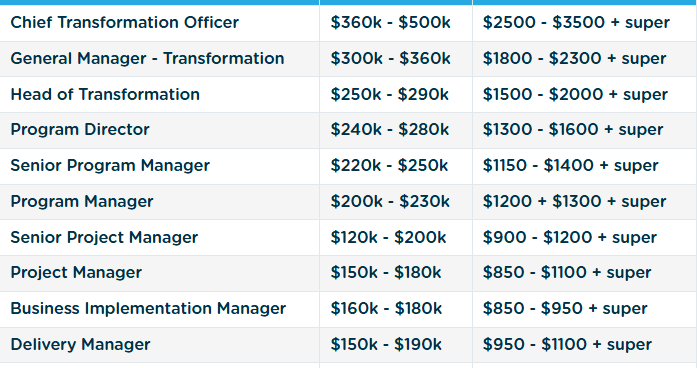So You Want to Get into Project Management?

A career in project management encompasses managing the end-to-end processes of a project, such as planning, organising and executing various tasks to take an idea and turn it into a deliverable product. In particular, being a project manager can involve overseeing projects across various industries, requiring vast amounts of specific expertise to ensure a team is consistent, effective and complying with all necessary governance when completing a project. This possibility of varied work can make for an exciting and rewarding career path.
In this guide:
- Project Management in a Nutshell
- Technical skills, specialisation tools and knowledge
- Recommended certifications & educational background
- What to expect from a career in Project Management
- Market Insights for Project Management roles
- Salaries and rates
- Considering a career in Project Management?
Project Management in a Nutshell
Working in project management often involves professionals getting a comprehensive overview of an organisation’s operations and allows individuals to interact with various stakeholders and business units in order to complete their work. This cross-business exposure or cross-fertilisation of knowledge is what makes the role attractive to many.
With project possibilities ranging from technology implementations to regulatory reforms, the field often provides continuous learning opportunities. With roles at all levels, from entry-level project programmers or PMO analysts to high-level positions such as Transformation/Program Director, Project Director or Head of PMO, the field offers opportunities for all different levels of seniority.
Talenza’s Victoria Director, Peter Rodriguez, notes that a career in project management is perfect for those who love a challenge and the need to always be learning.
"The project space is all about versatility and adaptability. You’re constantly learning and growing with each new project and that’s what keeps it exciting for many people."
The field doesn’t come without its challenges. Aligning changes and transformations with all stakeholders and ensuring consistent communication, managing economic fluctuations that might impact project availability and funding and maintaining project timelines and budgets are just some of the hurdles professionals in the field may face.
Technical skills, specialisation tools and knowledge
For those in the project management field having proficiency in tools like Microsoft Project Suite is essential. There is also domain-specific knowledge to be grasped with each new project, such as understanding regulatory requirements in financial services. Having a prior understanding of these nuances can be extremely helpful.
There are also standard project management tools that are crucial to understand in order to complete projects, along with other more specific tools that may vary depending on the domain of the work.
"In the project space, being well-versed in tools like JIRA and understanding Agile frameworks can set you apart,” explains Peter. “These are essential in managing tasks efficiently and keeping the project on track."
Recommended certifications & educational background
Most employers often look for project experience over qualifications. Often this involves looking for potential candidates who have experience working on projects within their industry (and with a candidate-rich market they often can afford to be picky, meaning exact experience is crucial).
If you’re looking to build your current experience with some qualifications, certifications such as PMP (Project Management Professional), PRINCE2 and Agile certifications can be useful in providing the necessary skills and frameworks to manage projects effectively.
"Certifications like PMP and Agile can give you a competitive edge. They’re highly regarded in the industry and provide a solid foundation for managing projects."
In order to build your network and stay on top of the latest industry trends, attending industry events, such as the Project Management Institute (PMI) conferences, Agile Australia or local project management meetups, can be valuable. Not only can these events open doors to new opportunities, but they also provide a great avenue for learning from other, more experienced people in the field.
What to expect from a career in Project Management
Many people in the project field work within the financial services sector. This often involves working in large teams with long timelines, typically lasting from 12 months to five years. The projects in this area can range from regulatory compliance to system implementations, each requiring meticulous planning and execution.
Outside of the financial sector, project management roles can span a variety of projects, including business, technology and those managed by a Project Management Office (PMO). In particular, business projects may involve implementing process improvements such as enhanced billing systems, while tech projects might focus on developing new apps or technologies.
For those taking on a project manager role, this position is often responsible for translating project goals to different stakeholders, managing timelines and ensuring compliance with governance and risk management. Those working within the PMO are often seen as auditing or oversight team, responsible for maintaining templates, schedules and ensuring consistency across projects.
In terms of a career path in the project management field, these often start in entry-level roles such as project or PMO analysts and progress to more senior positions such as Head of Transformation or Program Director.
Market Insights for Project Management Roles
There is currently a growing demand for project management professionals across various industries, particularly in technology, finance and healthcare. Companies are increasingly looking for candidates who can manage digital transformation projects and large-scale implementations.
There continues to be a consistent demand for positions for mandatory projects, including things like regulatory-based projects relating to industry changes. However, opportunities for projects focused on business optimisation or simplification that are not mandatory are less frequent due to being pushed back by budget constraints. This has meant a tightening in the job market, with a large focus in the field being on regulatory reforms, particularly in industries like finance, telecommunications and utilities, where these projects are often mandatory and have strict deadlines.
Digital transformation is also currently a key driver in the demand for project managers. As many companies continue to evolve their digital capabilities, there’s a need for professionals who can lead these initiatives.
Salaries and rates
Salaries in the projects field can vary depending on the industry, location and level of experience, however, there is a general trend towards increasing salaries and rates due to the growing demand for skilled professionals.

Considering a career in Project Management?
Many people find the project management field to make for a compelling career, particularly if the individual is highly outcomes-based, as the end goal is usually the delivery of a successful project. The more senior roles in the area are also seen as high impact as they tend to gain mindshare and get facetime with CEOs. The field also opens itself up to people from different areas. However, typically projects professionals begin their careers as a Business Analyst and work their way up to project management roles, making it a highly accessible and rewarding potential career choice.
Discover more about a career in project management or other fields by downloading our Salary Guide HERE.
If you’re looking to explore opportunities in the project management field, get in touch with:
Peter from Melbourne
Alex from Sydney
Lawrence from Brisbane